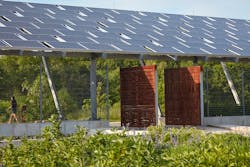Tuesday Webinar: Energy Sustainability and Eliminating Power Interruptions for Mission Critical Users
Climate change, and the crisis it brings to electric power delivery, is an ever accelerating problem for customers and utilities alike.
The back end of that crisis, of course, is downed power lines and power interruptions which sometimes last days and even weeks. The front end is investing in decarbonization and energy efficiency goals to hopefully avoid the back end in the future. Pay now or pay much more later.
Customers, utilities and contractors work together to embrace clean energy and resilient resources such as gen-sets while also ensuring that their power always stays on.
You can’t get much more mission critical than health care facilities and institutions of higher learning and research. To this end, three entities based in Pennsylvania worked to upgrade their own dedicated power systems, installing on-site power such as solar panels, battery storage and gen-sets, or also focusing investment on making buildings more efficient.
EnergyTech will play host to a webinar next week focusing on the work done by Penn State Health Milton Hershey Medical Center, Chatham University and Lafayette College. Joining the one-hour event will be an expert from Green Business Certification Inc., which partnered with the health care and university campus professionals to achieve goals in energy sustainability, resiliency and efficiency.
“Making Sustainability, Efficiency and Resiliency the Keystones of your Mission Critical Energy Goals” will be a free, one-hour webcast beginning 2 p.m. Tuesday, Dec. 14. The registration is right here.
Our speakers will include the Honorable Katherine Hammack, director of GBCI and former Assistant Secretary in the U.S. Army. She will be joined by Mary Whitney, director of Sustainability at Chatham University in Pittsburgh; and Kevin Kanoff, Campus Energy Engineering at Penn State Milton S. Hershey Medical Center.
EnergyTech Senior Editor Rod Walton will moderate the panel, which will be live and open to questions from attendees. Register here.
The Hershey Medical Center, with GCBI’s assistance, achieved PEER Platinum Certification, the highest possible, protecting nearly all of its distribution circuit with redundancy and auto restoration mechanisms. Half of its electrical load is served by zero or low-carbon energy resources.
Chatham University earned a PEER Silver Certification for its Eden Hall Campus, adding renewable energy and other grid upgrades. Lafayette College in Easton also achieved PEER Silver, having undergrounded all of its power distribution cables and delivering a district heating system for more efficient operations.
Click here to register for the free EnergyTech webinar on “Making Sustainability, Efficiency and Resiliency the Keystones of your Mission Critical Energy Goals.” The webinar will be live and available on demand for six months at energytech.com
About the Author
EnergyTech Staff
Rod Walton is head of content for EnergyTech.com. He has spent 17 years covering the energy industry as a newspaper and trade journalist.
Walton formerly was energy writer and business editor at the Tulsa World. Later, he spent six years covering the electricity power sector for Pennwell and Clarion Events. He joined Endeavor and EnergyTech in November 2021.
He can be reached at [email protected].
EnergyTech is focused on the mission critical and large-scale energy users and their sustainability and resiliency goals. These include the commercial and industrial sectors, as well as the military, universities, data centers and microgrids.
Many large-scale energy users such as Fortune 500 companies, and mission-critical users such as military bases, universities, healthcare facilities, public safety and data centers, shifting their energy priorities to reach net-zero carbon goals within the coming decades. These include plans for renewable energy power purchase agreements, but also on-site resiliency projects such as microgrids, combined heat and power, rooftop solar, energy storage, digitalization and building efficiency upgrades.
